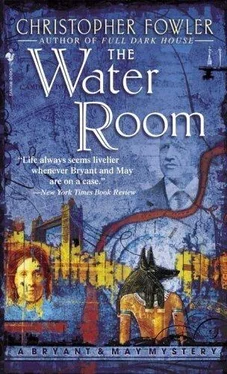Christopher Fowler - The Water Room
Здесь есть возможность читать онлайн «Christopher Fowler - The Water Room» весь текст электронной книги совершенно бесплатно (целиком полную версию без сокращений). В некоторых случаях можно слушать аудио, скачать через торрент в формате fb2 и присутствует краткое содержание. Год выпуска: 2006, Жанр: Детектив, на английском языке. Описание произведения, (предисловие) а так же отзывы посетителей доступны на портале библиотеки ЛибКат.
- Название:The Water Room
- Автор:
- Жанр:
- Год:2006
- ISBN:нет данных
- Рейтинг книги:5 / 5. Голосов: 1
-
Избранное:Добавить в избранное
- Отзывы:
-
Ваша оценка:
- 100
- 1
- 2
- 3
- 4
- 5
The Water Room: краткое содержание, описание и аннотация
Предлагаем к чтению аннотацию, описание, краткое содержание или предисловие (зависит от того, что написал сам автор книги «The Water Room»). Если вы не нашли необходимую информацию о книге — напишите в комментариях, мы постараемся отыскать её.
The Water Room — читать онлайн бесплатно полную книгу (весь текст) целиком
Ниже представлен текст книги, разбитый по страницам. Система сохранения места последней прочитанной страницы, позволяет с удобством читать онлайн бесплатно книгу «The Water Room», без необходимости каждый раз заново искать на чём Вы остановились. Поставьте закладку, и сможете в любой момент перейти на страницу, на которой закончили чтение.
Интервал:
Закладка:
‘Our pastor says it’s never too late.’ She eyed him doubtfully. ‘Although in your case I think he would have met his match.’
‘You must come and visit me in Chalk Farm,’ he offered.
‘No, thank you.’ She refolded her arms, determined not to show her true feelings. ‘I’m just getting used to not seeing you.’
He sat down on the brow of Primrose Hill, between the globe lights that illuminated pools of glittering emerald grass, and faced the conjurings of his mind. ‘Something is rising to the surface,’ he told May, hunching his shoulders and burying his mittens deep in his pockets. ‘Unhealthy vapours. You know how I get these feelings. Death is so powerful that its presence can be felt whenever someone sensitive is in close proximity.’
‘You’re a miserable sod. Birth is powerful, too-why don’t you feel babies being born? Always the morbid mind. These presentiments-you must know by now that they don’t always mean harm will fall. We can stop things happening.’
‘Not this time, John,’ said Bryant, pulling his ratty russet raincoat a little tighter.
‘Well, thanks for that warning from Doom Central. What’s prompted this?’
‘I’m not sure. The weather forecast, perhaps. There are storms on the way. Traditionally, harmful events in London are associated with prolonged bouts of low pressure and high moisture content in the air.’
‘You’re making that up.’
‘I promise you I’m not.’
‘Then it’s time to stop believing in evil omens,’ May decided, climbing to his feet. ‘Come on, I’ll buy you a pint of bitter at the Queen’s Head and Artichoke. Perhaps, just this once, there will be nothing bad for you to enjoy.’
9. RUNNING WATER
Nothing in London ever lies in the direction that you expect it to be. The Thames constantly appears to turn the wrong way. The London Eye seems to move around on its own accord. The tower at Canary Wharf wavers laterally like the point of a compass. Buildings north of the river suddenly appear to the south, and vice versa. Walking the streets, London shakes and rearranges itself like an amoeba. Kallie was thrilled at finally being able to get her bearings. She felt like placing a pin on a map. Balanced in the V of the roof, she studied the horizon. ‘The house faces east-west,’ she called down.
‘Is that good?’ Paul was framed in the window of the narrow attic, struggling into a sweater.
‘It means the front gets the morning sun, and the rear bedroom gets the sunset.’
‘How are the slates?’
She looked around her feet. ‘A few are broken. And there’s a busted gutter.’
‘It looks as though the rain comes in. She couldn’t have done anything to the place in thirty years. We could have had a survey done if you hadn’t been in such a rush.’
‘We’ll put it right bit by bit.’ She had a hard time explaining why the house meant so much to her. Paul had fantasized so often about being free to travel, it seemed odd that her instinct now was to put down roots. ‘We’re all packed in so closely together.’
‘What’s that?’
‘You can see rows and rows of Victorian terraces from up here. You’d think we would know more about each other. How do we all manage to live such separate lives?’
‘Come on down, the van’s here.’
Paul’s brother had brought over their clothes. Kallie had been shocked to see how easily her world could be packed into a few boxes. She suspected that Paul thought it was rather cool. He didn’t like the idea of becoming encumbered by belongings. She had agreed at the time, but being here changed everything. There was something about the house that made you want to draw the curtains and never go out.
She loved being up on the roof, feeling the first spackles of evening rain on her face, looking down at the ten gardens, five from the houses on her side of Balaklava Street, five more from the road beyond, grouped together like a densely cultivated park, divided by strips of fence and low brick walls. She counted rowans, wild cherry trees, a small-leafed lime, holly, crab apples, London plane trees, hornbeams, several ponds, sheds, clothes lines, a conspiracy of gnomes. The gardens harboured the interior life of the neighbourhood. Kids didn’t play on the streets any more, but the gardens were still safe, protected by terraced fortresses. She knew she would come up here often on summer nights, the way a cat climbs a tree to better survey its territory.
‘It smells damp,’ Neil sniffed. ‘Needs a lot of work.’ He picked at a corner of wallpaper in the hall and lifted it, running his finger across the powdery grey plaster. ‘All this will have to come off.’
‘It’s fine for now,’ Kallie told him, protectively smoothing the paper back in place. Neil worked for a mobile-phone company in the city, and wanted to be twenty-five for ever, even though he was in his early thirties. He treated his girlfriends like his cars, replacing them with more roadworthy models whenever they showed signs of mileage.
‘That’s the last box out,’ he told her. ‘There wasn’t much to unload. How are you going to fill the rooms?’
‘Self-assembly stuff, until we can afford something better.’
‘It’ll have to be flatpack to go down this hall.’ Neil had a warehouse apartment with porterage, but the open-plan design had made it virtually impossible for anyone to stay without being in the way.
Paul went off with his brother to buy him a thank-you beer, so Kallie spent her first evening in the house alone. The carpets were filthy. She vacuumed them as best as she could, then set about washing out the kitchen cupboards. Plastic buckets filled with hot soapy water and disinfectant began to make the place more inhabitable. The old lady hadn’t intentionally kept a dirty house, but she had clearly been unable to manage by herself. At least the electricity was back on, although it didn’t extend to all parts of the house; the ancient wiring needed replacing.
There were odd noises outside: a ceanothus rattling with fresh rain in the garden, dead laburnum leaves dropping on to the yellowed roof of the leaking lean-to conservatory. Inside, too, the pilot light of the central-heating system flared up with a pop that made her jump, pipes ticked as steadily as grandfather clocks, floorboards creaked like the decks of a galleon. The basement light switches didn’t work, and it wasn’t worth trying to clean by torchlight.
A dead woman’s house-worn cups and saucers, a drawer full of odd items of cutlery, another filled with string, bags, three-pin plugs and out-of-date discount vouchers, perished rubber teatowel holders from the seventies. Alien smells in the cupboards-packets of cardamom, juniper, custard powder, spills that were bitter and blackly sticky. Brown L-shaped marks on old linoleum where something heavy and ferrous had once stood and overflowed.
At ten-thirty she sat down in the ground-floor lounge to unpack linen and the handful of chipped china ornaments that had belonged to her grandmother. The street was preternaturally quiet, but now she could hear something. Setting down an armful of sheets, she rose and listened.
The sound of running water.
A steady susurration of rain, cataracts rushing through gutters, swirling into zinc funnels, precipitating through plastic pipes, racing across the bars of a drain. The crepitation was steadily rising to a crescendo.
She climbed the stairs to the floor above and walked into the second bedroom: no light bulb in here. The damp wood of the window frame had swollen so much that she couldn’t budge it. The sound was softer beneath the roof, so it couldn’t be loose guttering. Collecting her torch from the hall, she clicked it on and ventured into the basement. They would take out the non-supporting walls, she decided, repair the conservatory and bring more light in from the raised garden. The bathroom was absurdly large for the house. She supposed a parlour had been converted, yet it seemed odd to have had a parlour with only a single tiny window, high and crossed with bars, little more than a skylight looking out at street level.
Читать дальшеИнтервал:
Закладка:
Похожие книги на «The Water Room»
Представляем Вашему вниманию похожие книги на «The Water Room» списком для выбора. Мы отобрали схожую по названию и смыслу литературу в надежде предоставить читателям больше вариантов отыскать новые, интересные, ещё непрочитанные произведения.
Обсуждение, отзывы о книге «The Water Room» и просто собственные мнения читателей. Оставьте ваши комментарии, напишите, что Вы думаете о произведении, его смысле или главных героях. Укажите что конкретно понравилось, а что нет, и почему Вы так считаете.












